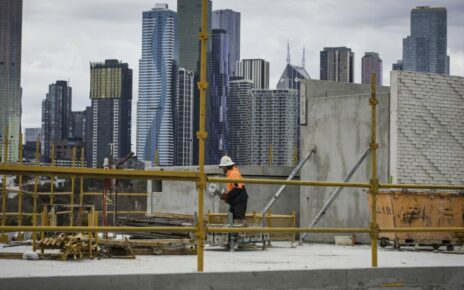Key points
- An annual celebration of the arrival of European settlers in Melbourne on August 30 won’t go ahead this year.
- This year’s Melbourne Day would have been the 187th birthday of the city, commemorating settlers who sailed from Tasmania aboard the schooner Enterprize.
- The City of Melbourne stopped providing support for Melbourne Day several years ago and is reconsidering its involvement in Australia Day.
An annual celebration of the arrival of European settlers in Melbourne won’t go ahead this year, but organisers are keen to see the day make a comeback despite the controversy surrounding it.
The Melbourne Day committee marks August 30 as the date settlers arrived from Tasmania aboard the ship Enterprize and this year the day is Melbourne’s 187th “birthday”.
Chairman of the Melbourne Day committee Campbell Walker, who is the son of former lord mayor Ron Walker, says there will be no activities or celebrations this year.Credit:Jason South
But with Victoria in the process of hammering out a treaty with Indigenous peoples amid questions being asked about other celebrations of colonial history, one Indigenous academic said marking Melbourne’s first European settlers was “meaningless”.
In the past, the day has involved raising the Melbourne flag at Enterprize Park, a full gun salute, running a Junior Lord Mayor of Melbourne competition and handing out free cupcakes.
However, in recent years the City of Melbourne ended its support for the day and organisers have struggled for funding.
Chairman of the Melbourne Day committee, Campbell Walker, said Melbourne Day would take “a bit of a hiatus” this year.
A commemoration of Melbourne Day in 2008. Credit:The Age
“We’ll have a gap year this year and do a bit of regrouping and realigning and sort of taking on a little bit of public opinion, I suppose as well, to see what is important to people,” he said.
Walker, whose father was former lord mayor Ron Walker said Indigenous groups had been “really supportive” of Melbourne Day in the past.
“Some of the early workings of the committee were about understanding some of the white settlement and founders of Melbourne, well after Aboriginal settlement of course, and also to get the history right,” he said.
In its early years, Walker said the day had been “bigger than Ben-Hur” but had waned due to a lack of support from the City of Melbourne and private sponsors.
Former lord mayor John So waves a Melbourne flag for Melbourne Day in 2008. Credit:The Age
The City of Melbourne used to provide financial and administrative support for Melbourne Day but has not since 2017, apart from Lord Mayor Sally Capp participating in the Junior Lord Mayor of Melbourne program. Capp declined to comment.
Sue Stanley, Melbourne Day committee member and former world aerobics champion, said the day was about remembering Melbourne’s past and celebrating its future.
The Statue of John Batman stood in the forecourt of the Suncorp Building on the corner of Collins and William streets.Credit:Luis Enrique Ascui
She said the City of Melbourne’s response to Melbourne Day was “interesting”.
”We are unsure on Town Hall and the mayor’s standing as they are rethinking Australia Day and how they are going to allow us Melburnians to celebrate,” Stanley said.
There has been a growing push to stop celebrating Australia Day on January 26, the date when Captain Arthur Phillip raised the Union Jack at Sydney Cove in 1788, as it signifies the start of massacres, land theft, loss of culture and suffering inflicted on First Nations people.
Melburnians have already begun grappling with the legacy of the city’s past with John Batman’s name stripped from the federal electorate named after him and the Moreland City Council voting this year to change its name to Merri-bek ending its 28-year association with a Jamaican sugar plantation that used slave labour.
Twin statues of Batman and John Pascoe Fawkner, regarded by many as the “founding fathers” of Melbourne are in storage after they were removed from their plinths on Collins Street in 2018.
Julie Andrews, academic director of Indigenous research at La Trobe University, questioned how Melbourne Day fitted in with the treaty process and truth telling.
Claire McDaniel, who was Melbourne’s junior lord mayor in 2015.Credit:Eddie Jim
“Melbourne Day is meaningless today,” she said. “You have to have days that are meaningful to a community, to a society and to a city. Not everyone knows what this is, let alone supports it. It is not a day that people would relate to.”
A spokeswoman for the Wurundjeri Woi Wurrung Cultural Heritage Aboriginal Corporation said, much like Australia Day, the Wurundjeri did not support the celebration of Melbourne Day.
“It is an invasion that caused the dispossession of Wurundjeri country from their ancestors and generational trauma that still impacts people,” she said.
The council will reconsider its involvement in Australia Day at a meeting on September 6.
”[The City of Melbourne] is on the record as not supporting Australia Day or Melbourne Day or anything to do with European settlement,” Walker said. “It does need funding to make it worthwhile. There’s really no point in doing something half-hearted. I think that’s damaging to the brand.”
Not all of the council is against it, with councillor Philip Le Liu keen for the City of Melbourne to restart its support for Melbourne Day.
“I’m happy to support keeping everything, I don’t like to just remove things,” Le Lieu said. “To celebrate one thing doesn’t mean that we have to cancel another.”
While it has been three years since the last commemoration of Melbourne Day due to lockdowns and the hiatus this year, Walker is keen to bring the day back as “bigger and better” next year.
“No one’s told me it’s a bad idea,” he said.
The Morning Edition newsletter is our guide to the day’s most important and interesting stories, analysis and insights. Sign up here.
Most Viewed in Politics
From our partners
Source: Read Full Article







